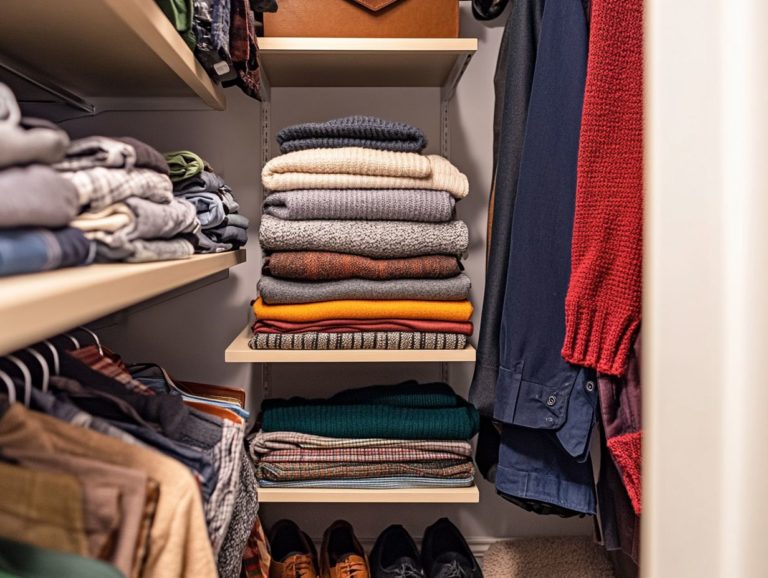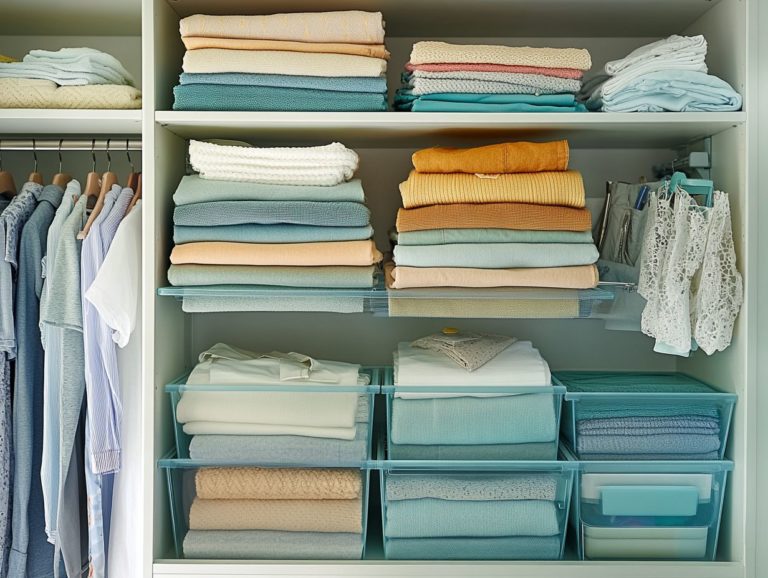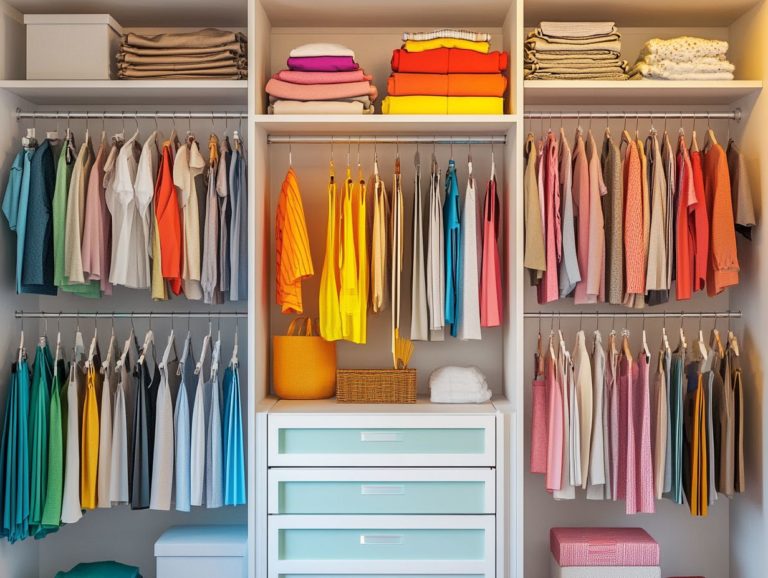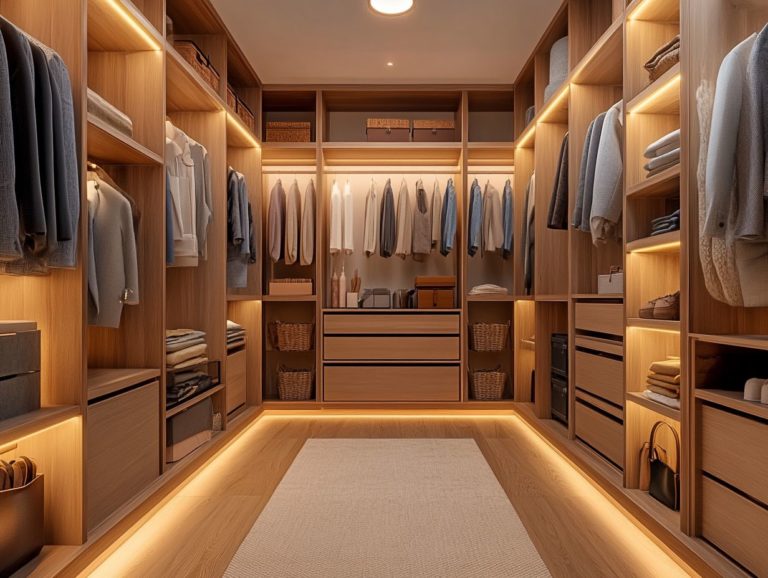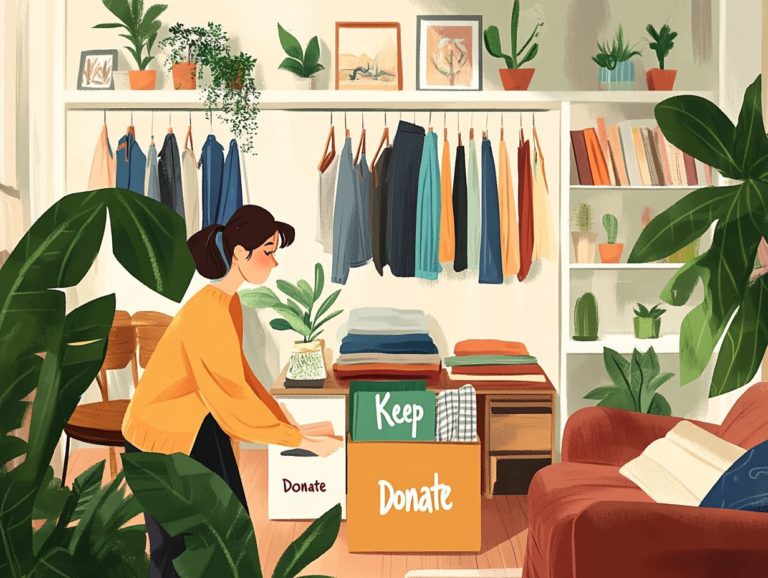Why Decluttering is Essential for Minimalism
In a world teeming with possessions and distractions, minimalism presents a refreshing antidote. This lifestyle encourages you to embrace simplicity and intentionality, urging a focus on what truly matters.
At the core of minimalism is the practice of decluttering, which not only clears physical space but also cultivates mental clarity and emotional well-being. This article delves into the principles of minimalism, the benefits of decluttering, practical steps to achieve a minimalist lifestyle, and strategies to maintain it.
Join in as you embark on this transformative journey toward a simpler, more fulfilling life.
Contents
- Key Takeaways:
- The Concept of Minimalism
- The Relationship Between Decluttering and Minimalism
- Your Simple Steps to Decluttering
- Steps to Decluttering for Minimalism
- Maintaining a Minimalist Lifestyle
- Overcoming Challenges in the Decluttering Process
- Frequently Asked Questions
- Why is decluttering important for a minimalist lifestyle?
- How does decluttering contribute to achieving a minimalist lifestyle?
- What are the benefits of decluttering for a minimalist lifestyle?
- How often should one declutter to maintain a minimalist lifestyle?
- Can decluttering be overwhelming for some individuals?
- How can one start the decluttering process to simplify their lifestyle?
Key Takeaways:
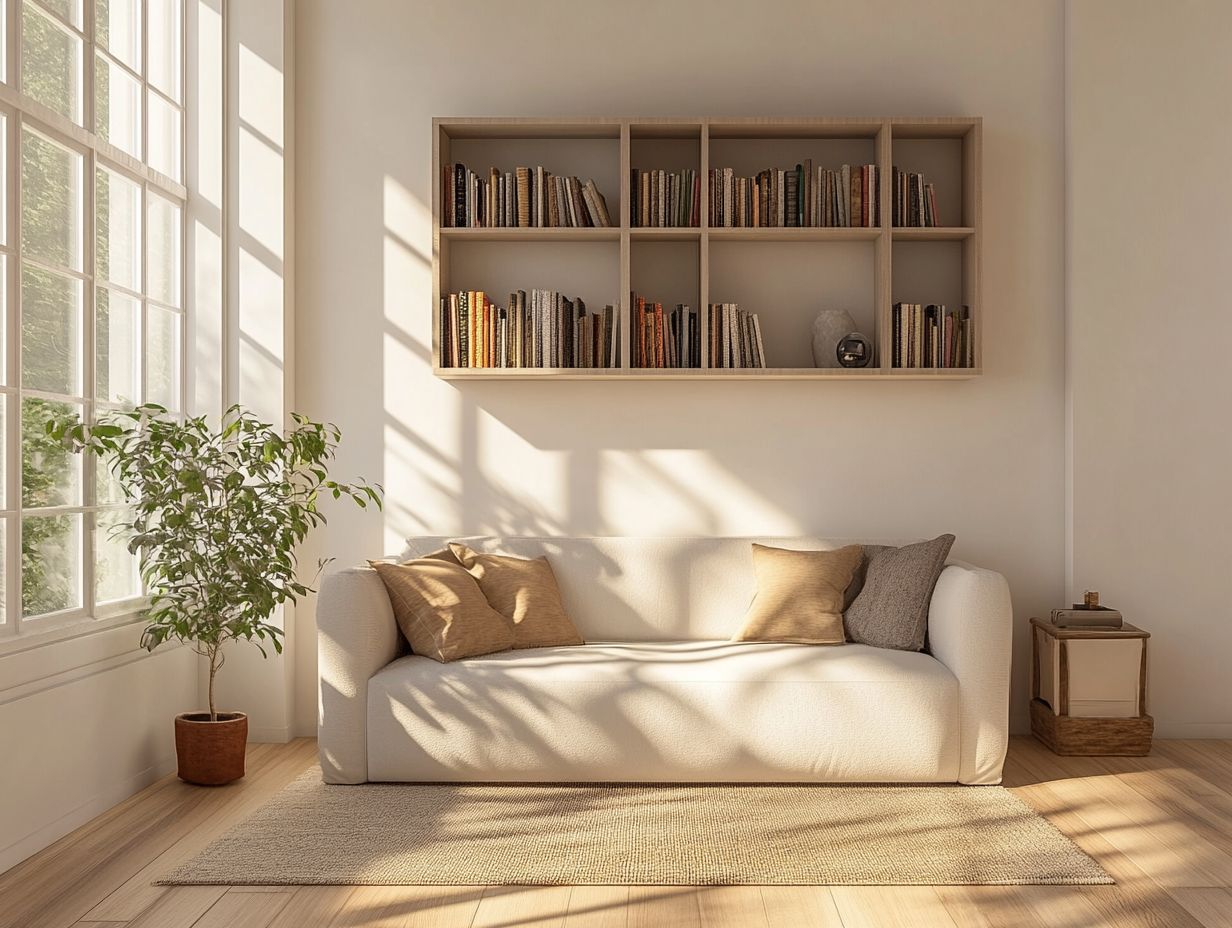
- Decluttering is an essential aspect of minimalism, as it helps create a clutter-free and organized environment that aligns with the principles of minimalism.
- Decluttering offers both physical and mental benefits, such as creating more space, reducing stress, and promoting a sense of peace and clarity in the mind.
- To successfully maintain a minimalist lifestyle, it is important to regularly declutter and have strategies in place to overcome common challenges, such as sentimental attachments to possessions.
The Concept of Minimalism
Minimalism goes beyond aesthetics. It represents a balanced way of living that invites you to simplify your existence by emphasizing meaningful possessions and intentional choices.
This way of living nurtures a mindset rooted in freedom and purpose. When you reduce clutter, you clear your mind and emotions, cultivating healthier relationships with your belongings, environment, and community. Ultimately, it transforms your experience into one of enrichment rather than a burdensome routine overwhelmed by consumerism.
Defining Minimalism and its Principles
Defining minimalism involves grasping its main ideas, which focus on keeping things simple and choosing what matters most in your possessions. These guiding tenets prompt you to reflect deeply on your choices and lifestyle, ultimately helping you cultivate an environment where distractions are minimized and clarity is enhanced.
In practice, embracing minimalism might mean cleaning up your home, curating meaningful items that spark joy, and choosing experiences over material acquisitions. By adopting thoughtful buying choices, you can streamline your belongings, ensuring that each item serves a purpose or brings you delight.
You can easily add minimalism to your daily life by focusing on important tasks, which can lead to heightened productivity and a clearer mindset.
The Relationship Between Decluttering and Minimalism
The relationship between decluttering and minimalism is essential, as decluttering acts as a practical pathway to embracing a minimalist lifestyle. By removing unnecessary clutter and promoting organization in your living spaces, you can significantly enhance your mental clarity and emotional well-being.
How Decluttering Helps Achieve Minimalism
Decluttering is key to achieving minimalism, creating a physical space that mirrors a clear and focused mindset, free from the distractions of unnecessary clutter. Engaging in this intentional process cultivates clarity and purpose, enabling you to concentrate better on your personal goals and values.
By systematically removing items that no longer serve you, you enhance your living environment and foster emotional well-being. A decluttered space alleviates stress and anxiety, promoting mindfulness and tranquility. Practically speaking, this translates to easier maintenance and organization of your home, perfectly aligning with the principles of why you should start decluttering today.
Embracing a decluttered lifestyle encourages you to make more thoughtful purchasing decisions, emphasizing quality over quantity while nurturing a deeper appreciation for the essentials.
Are you ready to transform your life? Let s dive into the world of minimalism together!
Your Simple Steps to Decluttering
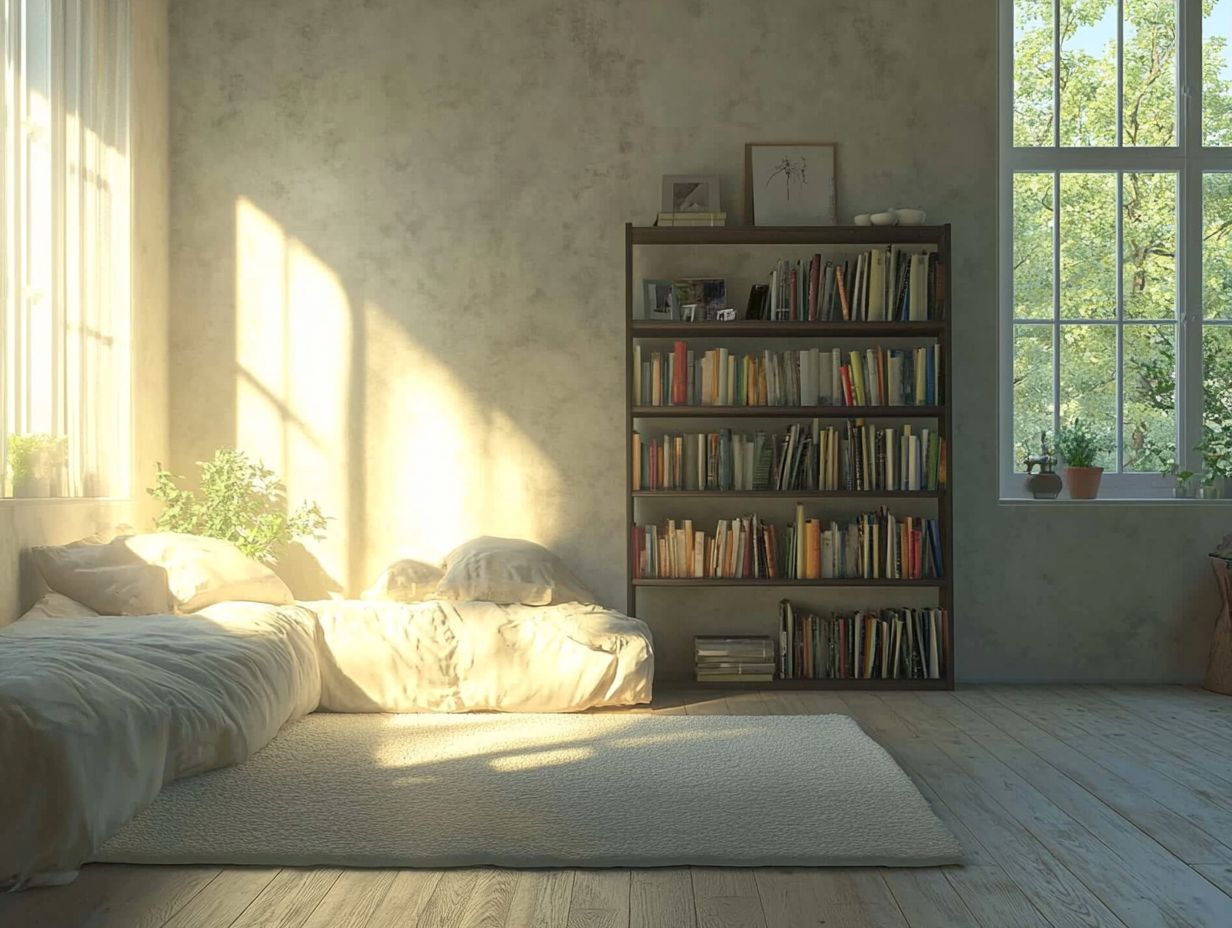
The benefits of decluttering in your pursuit of minimalism reach far beyond simple organization. They encompass profound physical, mental, and emotional enhancements that promote a healthier and happier lifestyle. Ultimately, this contributes to your overall well-being and energy.
Physical, Mental, and Emotional Benefits
The physical and mental benefits of decluttering are nothing short of transformative. You ll experience improved health outcomes thanks to a cleaner environment. This is alongside enhanced mental clarity that alleviates anxiety and boosts productivity.
By embracing a minimalist lifestyle, you may find that a less cluttered space not only sparks creativity but also cultivates a profound sense of peace and tranquility. Research indicates that minimizing your belongings can significantly lower stress levels and sharpen your focus, facilitating more efficient decision-making. A tidy environment also promotes better hygiene, reducing allergens and elevating your overall well-being.
Ultimately, this process of simplification gives you the power to invest your time and energy into what truly matters. This leads to greater satisfaction and fulfillment in your daily life.
Steps to Decluttering for Minimalism
Embarking on your journey toward minimalism demands a systematic approach. With clear steps and practical tips, you can transform your space and habits into an organized haven. This fosters both clarity and peace of mind.
Simple Tips to Get You Started
Implementing practical tips and strategies for decluttering can greatly smooth your transition into a minimalist lifestyle. This enhances your organization while freeing up valuable space in your home.
Start small perhaps by tackling one room or even a single drawer at a time to avoid feeling overwhelmed. This makes the process more manageable. Creating a clear plan or checklist will help you maintain focus and ensure nothing slips through the cracks.
Consider adopting the ‘one in, one out‘ rule. This means that whenever you bring in a new item, you should remove an old one. Regularly scheduling decluttering sessions whether monthly or seasonally will keep organization at the forefront of your priorities. This prevents clutter from creeping back into your living space.
Emphasize multi-functional furniture to enhance both aesthetics and functionality. This ultimately contributes to a serene and clutter-free environment.
Maintaining a Minimalist Lifestyle
Embracing a minimalist lifestyle is not just about that initial decluttering session; it demands ongoing dedication to organization. You also need to develop habits that foster a clutter-free space.
This commitment ensures that simplicity stays front and center in your daily life. It enriches your experience and promotes clarity in every moment.
Sustaining a Clutter-Free Environment
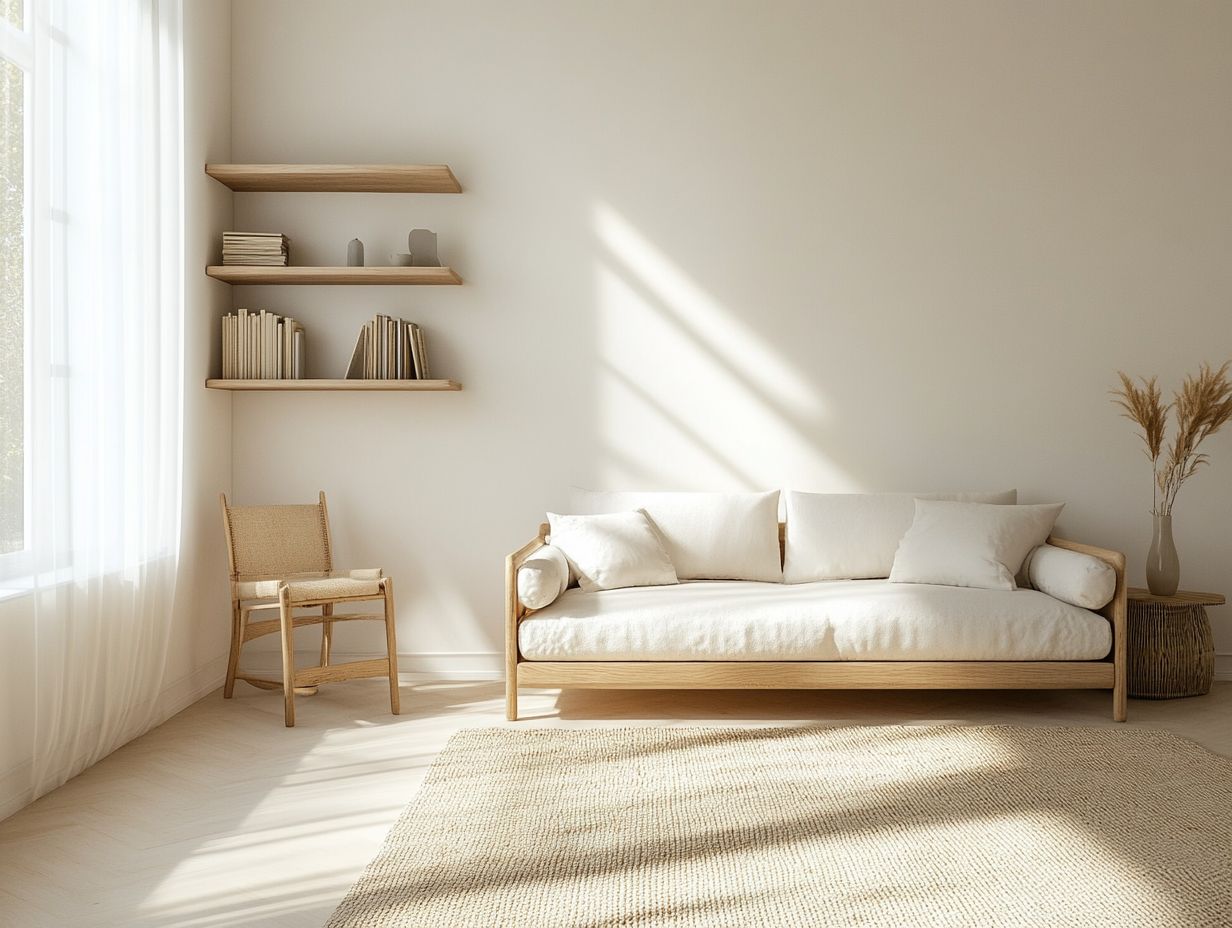
Sustaining a clutter-free environment is essential for you to truly enjoy the benefits of minimalism. This requires building strong habits and effective organization strategies that align with the principles of simplicity.
Establishing daily routines can significantly enhance your ability to maintain a serene space. For instance, dedicating just ten minutes each day to decluttering can create a lasting impact. Sorting items into categories and embracing a one-in, one-out rule can prevent accumulation. This reinforces the minimalist mindset you re aiming for.
Creating designated spaces for your essential belongings promotes organization and fosters a sense of calm. Regularly reassessing your possessions allows you to make conscious decisions about what truly adds value to your life. This ensures that only meaningful items remain. Ultimately, it s these habits that pave the way for a consistently clutter-free lifestyle.
Overcoming Challenges in the Decluttering Process
Overcoming challenges in decluttering is a pivotal step toward embracing minimalism. You may encounter various obstacles that can impede your progress. This makes it vital to cultivate resilience and a steadfast commitment to the decluttering journey.
Start your decluttering journey today, and discover the freedom of minimalism!
Common Obstacles and How to Overcome Them
Many people find it hard to let go of items because of feelings like attachment. Fear of making the wrong choice can also lead to clutter accumulation.
To overcome this, try the ‘one in, one out’ rule. This means you remove one item for every new item you bring in.
Another effective approach is to set small, manageable goals. Focus on one category at a time to make the task of decluttering feel achievable.
By breaking it down into achievable steps, you ll feel a sense of accomplishment.
Frequently Asked Questions
Why is decluttering important for a minimalist lifestyle?
Decluttering is crucial for minimalism because it helps you get rid of unnecessary items. This creates a simpler, more organized living space.
It also allows you to focus on what truly matters, reducing distractions in your life.
How does decluttering contribute to achieving a minimalist lifestyle?
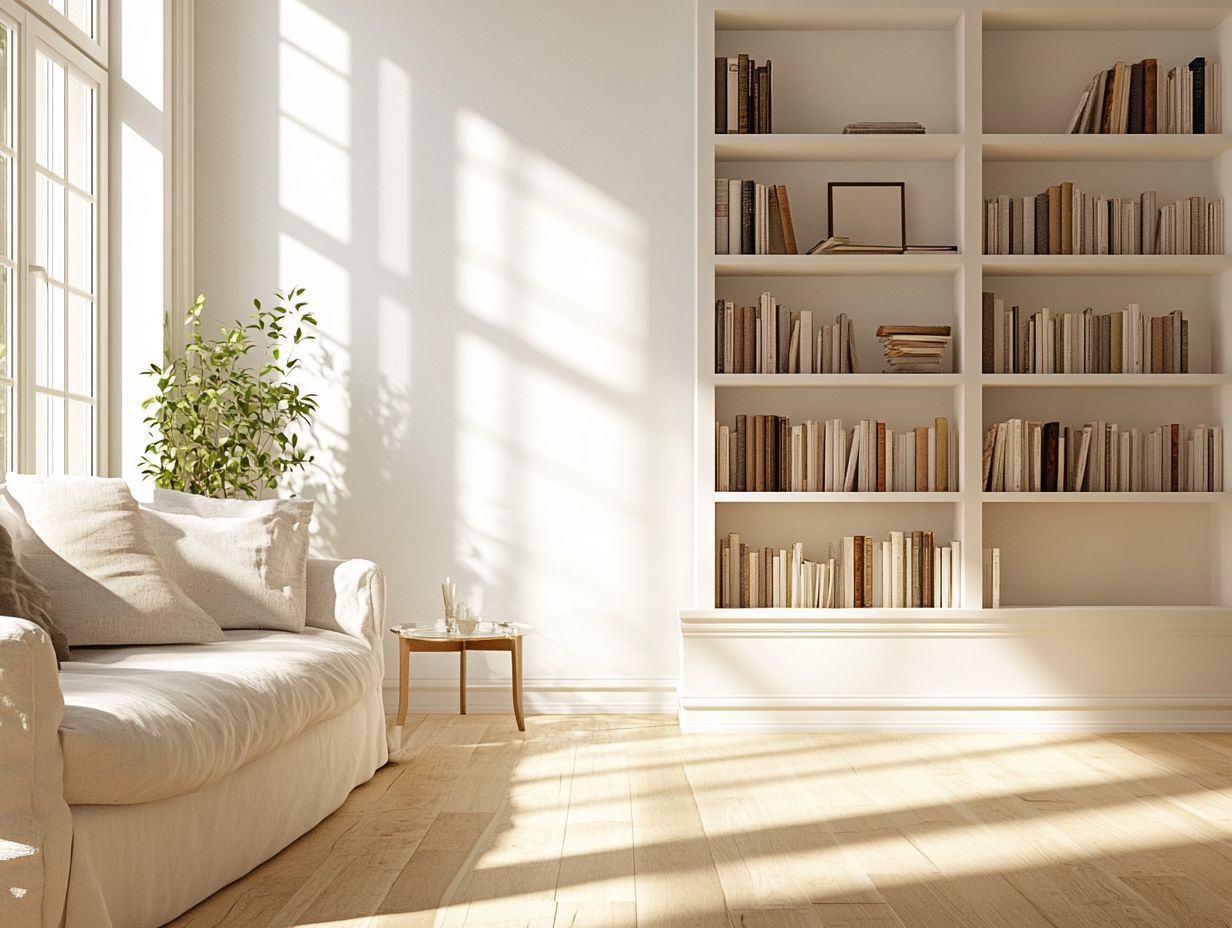
Decluttering is key to minimalism as it helps you let go of excess belongings. This simplification aligns with the principles of living intentionally.
What are the benefits of decluttering for a minimalist lifestyle?
Decluttering offers many benefits, such as reduced stress and anxiety. It also boosts focus and productivity while making your living space more visually appealing.
Additionally, it saves time and money by preventing unnecessary purchases.
How often should one declutter to maintain a minimalist lifestyle?
How often you declutter can vary from person to person, but regular decluttering is recommended. This could be every few months or even quarterly.
Consistent decluttering helps prevent unnecessary items from accumulating, keeping your space clutter-free.
Can decluttering be overwhelming for some individuals?
Decluttering can indeed feel overwhelming, especially with strong attachments to belongings. Remember, it’s a process that can be tackled gradually.
Start small by focusing on one area at a time to make it manageable.
How can one start the decluttering process to simplify their lifestyle?
The first step is to identify your goals and priorities. This helps you figure out what items are essential and what can be let go of.
Then, declutter one room or area at a time, being honest about what you truly need.
Start decluttering today and enjoy a stress-free space!

